In the manufacturing sector, change is constant. From evolving consumer demands to global supply chain shifts, manufacturers are continually under pressure to innovate and optimize their operations. But while production lines are modernizing, many manufacturers still struggle with one critical component: their technology infrastructure. This often results in inefficiencies, increased downtime, and vulnerability to cyber threats: issues that can significantly hinder progress in an increasingly digital world.
Imagine a factory floor where machines are constantly connected, data is flowing freely across systems, and operations are smooth with minimal disruptions. For many manufacturers, this vision is not a distant dream, but a reality made possible by managed IT services for manufacturing. The role of these services has grown far beyond basic tech support – they are now at the heart of digital transformation, offering specialized expertise and proactive solutions that keep businesses running at full capacity.
As manufacturers continue to embrace new technologies – such as IoT, AI, and automation – the need for reliable, secure, and efficient IT management becomes more pressing. But whether it’s optimizing operational efficiency, improving security, or ensuring compliance, managed services in manufacturing are becoming indispensable in helping companies thrive in the digital age.
The Risks of Not Implementing Managed Services in Manufacturing
In the manufacturing sector, technology plays a crucial role in optimizing operations, ensuring security, and enabling growth. Without manufacturing managed services, companies often struggle to maintain the efficiency and reliability their operations demand. Issues such as system failures, cybersecurity vulnerabilities, and operational inefficiencies are not only costly but also jeopardize business continuity and without the expertise of an IT partner, these challenges often go unresolved until they lead to significant disruptions.
Beyond the immediate operational setbacks, neglecting IT managed services for manufacturing firms can also result in missed opportunities. As the industry rapidly adopts technologies like IoT, AI, and automation, manufacturers without dedicated IT support find it challenging to stay competitive. Inadequate disaster recovery plans and outdated systems can leave businesses vulnerable to data loss and prolonged downtime, further hindering their ability to innovate and grow.
Key Risks:
- Uncontrolled IT Costs: Unmanaged IT often leads to escalating costs due to unaddressed issues and reactive solutions.
- Increased Downtime: Cyberattacks or system failures result in costly disruptions to productivity.
- Data Security Vulnerabilities: Lack of robust security exposes manufacturers to data breaches and intellectual property theft.
- Operational Inefficiencies: Outdated systems and inefficiencies in IT management limit potential for technological advancement.
- Inadequate Disaster Recovery: Without a recovery plan, businesses risk losing critical data and facing prolonged downtime.
- Missed Technological Advancements: Manufacturers without managed IT services struggle to adopt and integrate cutting-edge technologies that could enhance operations.
Neglecting IT managed services in manufacturing can expose businesses to significant risks, including downtime and security vulnerabilities, which can derail operations and stunt growth. To counter these challenges, integrating essential IT components like network management, cloud solutions, and cybersecurity becomes crucial; these services not only protect against potential disruptions but also enhance operational efficiency, ensuring a smoother, more resilient path forward.
Key Components of Managed IT Services in Manufacturing
Managed IT services play a crucial role in ensuring that manufacturing operations run efficiently, securely, and without disruption. These services encompass several key components that address the specific needs of manufacturers, from maintaining network security to optimizing productivity with cloud-based solutions.
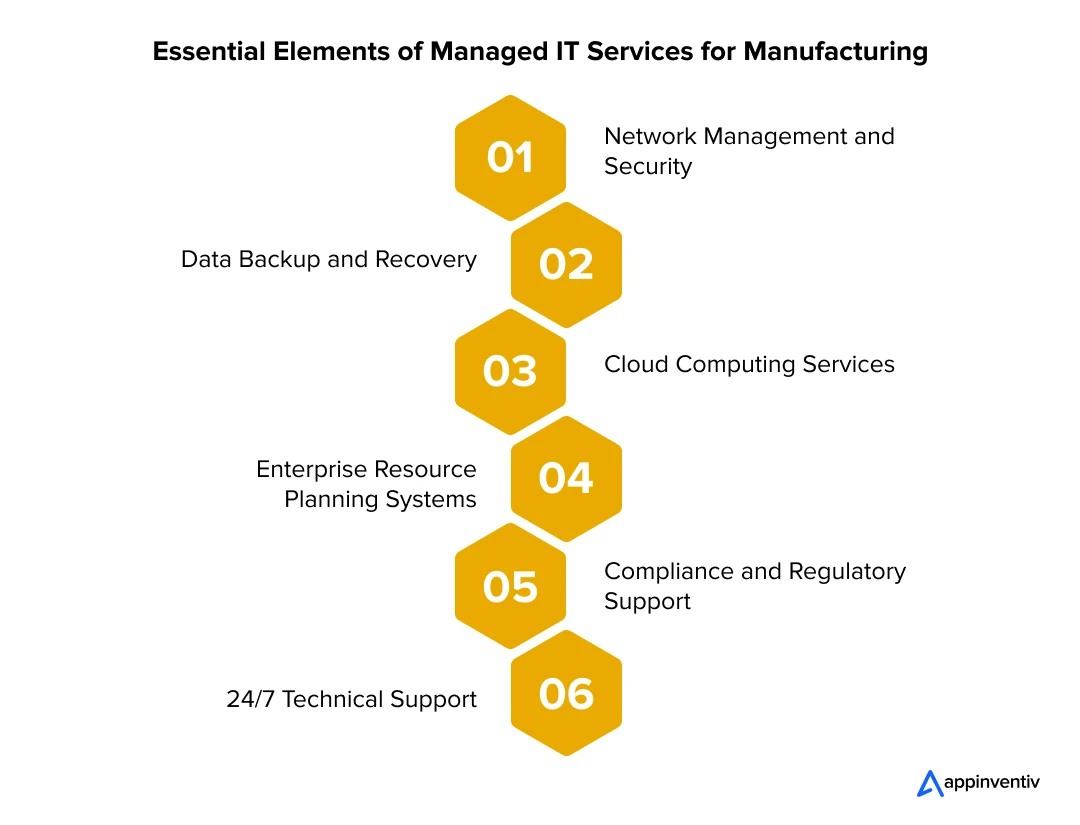
- Network Management and Security: Design and management of secure, high-performance networks to prevent cyber threats and system disruptions.
- Data Backup and Recovery: Regular backups and recovery plans to minimize downtime and safeguard data.
- Cloud Computing Services: Scalable resources and real-time tools to enhance collaboration and operational flexibility.
- Enterprise Resource Planning Systems: Integration of various business processes, optimization of inventory, production, and financial management through ERP manufacturing software development.
- Compliance and Regulatory Support: Assistance with maintaining adherence to industry regulations and standards.
- 24/7 Technical Support: Continuous support to resolve IT issues and ensure minimal operational disruptions.
By implementing key IT components such as network management, cloud solutions, and robust cybersecurity in manufacturing operations, manufacturers can create a strong foundation for success. These critical elements of managed services in manufacturing not only secure and streamline day-to-day activities but also unlock a range of significant benefits. Benefits we are going to discuss in detail, next.
Benefits of Managed IT Services in Manufacturing
Adopting managed services for the manufacturing industry brings substantial benefits that go beyond just securing and maintaining systems. These services allow manufacturers to streamline operations, reduce costs, and enhance productivity, all while focusing on their core business goals. The integration of MSPs enables manufacturers to leverage cutting-edge technology, maintain compliance, and safeguard their assets in a competitive market.
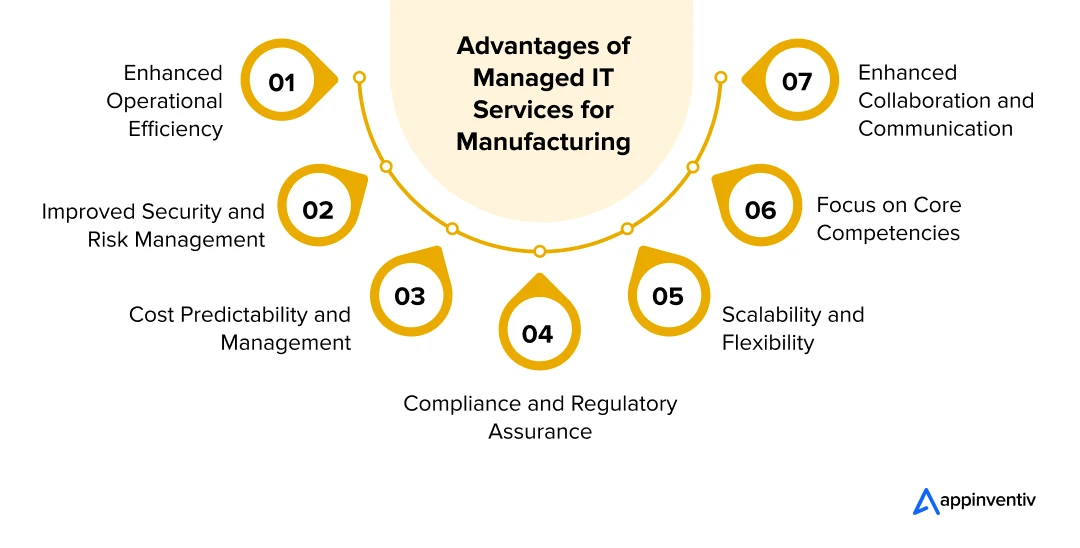
Enhanced Operational Efficiency: Managed IT services for manufacturing firms provide proactive monitoring, ensuring systems are running optimally and identifying potential issues before they disrupt production. This reduces downtime and enhances the overall performance of the manufacturing process.
Improved Security and Risk Management: With the increasing threat of cyberattacks, MSP manufacturing implements robust security measures, such as malware detection, encryption, and continuous monitoring. These safeguards protect sensitive data and intellectual property, ensuring business continuity.
Cost Predictability and Management: By offering fixed pricing models, the benefits of IT managed services for manufacturing revolve around better prediction of IT costs and elimination of unexpected expenses. This cost-effective approach also optimizes resource allocation, ensuring the business stays within budget while receiving the necessary technological support.
Compliance and Regulatory Assurance: With stricter regulations, manufacturers need to stay compliant with industry standards. MSPs ensure adherence to necessary regulations, preventing costly fines and ensuring that processes are continuously monitored and audited for compliance.
Scalability and Flexibility: Another advantage of managed services in the manufacturing industry is in MSPs being able to provide scalable IT solutions that adapt to a manufacturer’s evolving needs. As businesses grow, these services can expand seamlessly, ensuring that infrastructure and technology keep pace with production demands.
Focus on Core Competencies: By offloading IT management to MSPs, manufacturers can focus on their core competencies, such as production and innovation. This allows them to stay competitive while ensuring IT systems are optimized and secure.
Enhanced Collaboration and Communication: IT Managed services in manufacturing offer cloud-based collaboration tools that enhance communication within teams and across departments. This ensures that all stakeholders have access to real-time data, facilitating faster decision-making and reducing inefficiencies.
If there is one thing these advantages of managed services in the manufacturing industry makes evident, it is the fact that incorporating MSPs into the manufacturing space not only provides security and efficiency but also enables long-term growth and sustainability in a rapidly evolving industry.
But in order to truly gauge the benefits of IT managed services for manufacturing, it is critical that we look into applications of the technology in the process-intensive domain.
Let’s look into that next.
Managed IT Services for Manufacturing Use Cases
Managed IT services are transforming the manufacturing sector by supporting businesses in adopting smart manufacturing technologies while optimizing operations for efficiency and cost savings. These services provide the infrastructure, security, and support necessary for integrating advanced technologies like the IoT, artificial intelligence, and big data analytics into manufacturing operations. By harnessing these technologies, manufacturers can streamline processes, enhance automation, and make informed, data-driven decisions to stay ahead of the competition.
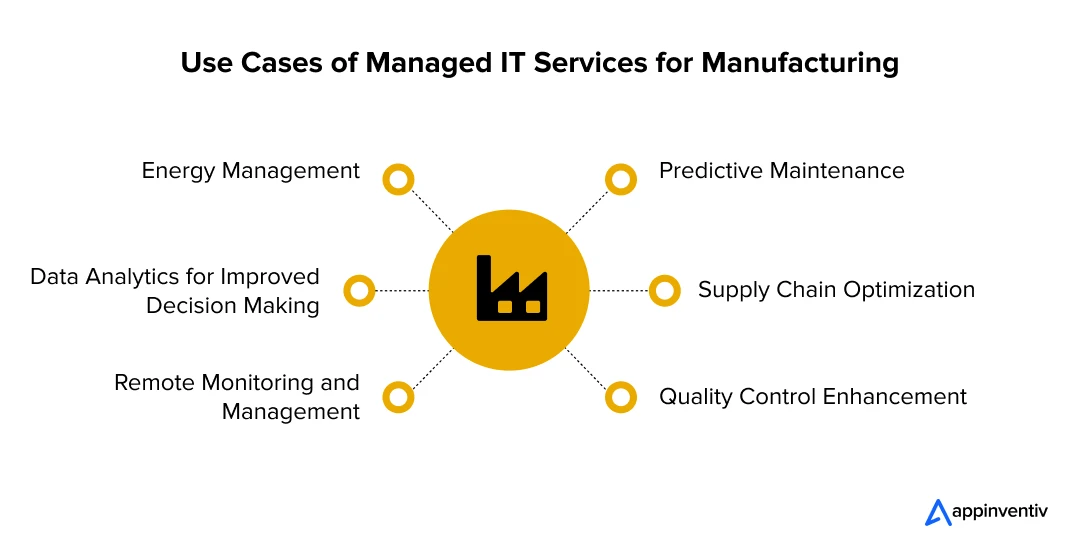
Predictive Maintenance: The range of Managed IT services for a manufacturing company can collect and analyze data from equipment sensors to predict when machinery is likely to fail. This enables manufacturers to perform timely maintenance and avoid unexpected breakdowns, reducing downtime and repair costs.
Supply Chain Optimization: MSPs improve supply chain efficiency by providing real-time data on inventory, procurement, and logistics. This allows manufacturers to optimize inventory levels, reduce waste, and improve delivery speed, leading to cost savings and enhanced customer satisfaction.
Quality Control Enhancement: Managed IT services for manufacturing implement AI and machine learning algorithms to monitor production quality in real-time, identifying anomalies early on and minimizing defects. This leads to improved product consistency, reduced waste, and lower costs related to returns and rework.
Energy Management: Through integrated IT solutions, the role of IT services in smart manufacturing has come to the surface. Through the technology, manufacturers can monitor and analyze energy consumption, identifying inefficiencies and opportunities for energy savings. To enable this, managed IT services in manufacturing can be used to suggest energy-efficient practices and tools to lower operational costs while improving sustainability.
Data Analytics for Improved Decision Making: By harnessing big data, MSPs help manufacturers gather, analyze, and interpret vast amounts of production data. This enables better decision-making, optimization of processes, and identification of areas for cost reduction and process improvement.
Remote Monitoring and Management: With the help of IT managed services in manufacturing, companies can implement remote monitoring systems to keep track of operations from any location. This remote access ensures faster response times to potential issues and reduces the need for on-site troubleshooting, saving both time and money.
By integrating these managed IT services for manufacturing use cases, manufacturers can fully realize their potential, improving operational efficiency, reducing costs, enhancing product quality, and driving growth in an increasingly competitive market.
As we’ve explored, the implementation of managed IT services offers tangible advantages in various use cases. To realize these, however, manufacturers must take careful steps to integrate managed IT services into their operations. By following a structured approach, manufacturers can harness the full potential of managed IT services to drive innovation and operational efficiency.
Steps to Successfully Integrate Managed IT Services in Manufacturing
Implementing manufacturing managed services is a strategic decision that can greatly improve efficiency, security, and cost-effectiveness. However, the process requires careful planning and execution to ensure a seamless transition and optimal outcomes. By following a structured approach, manufacturers can maximize the benefits of their MSP partnership and position their business for long-term success. Below is a detailed breakdown of the steps involved in successfully integrating MSP into a manufacturing operation.
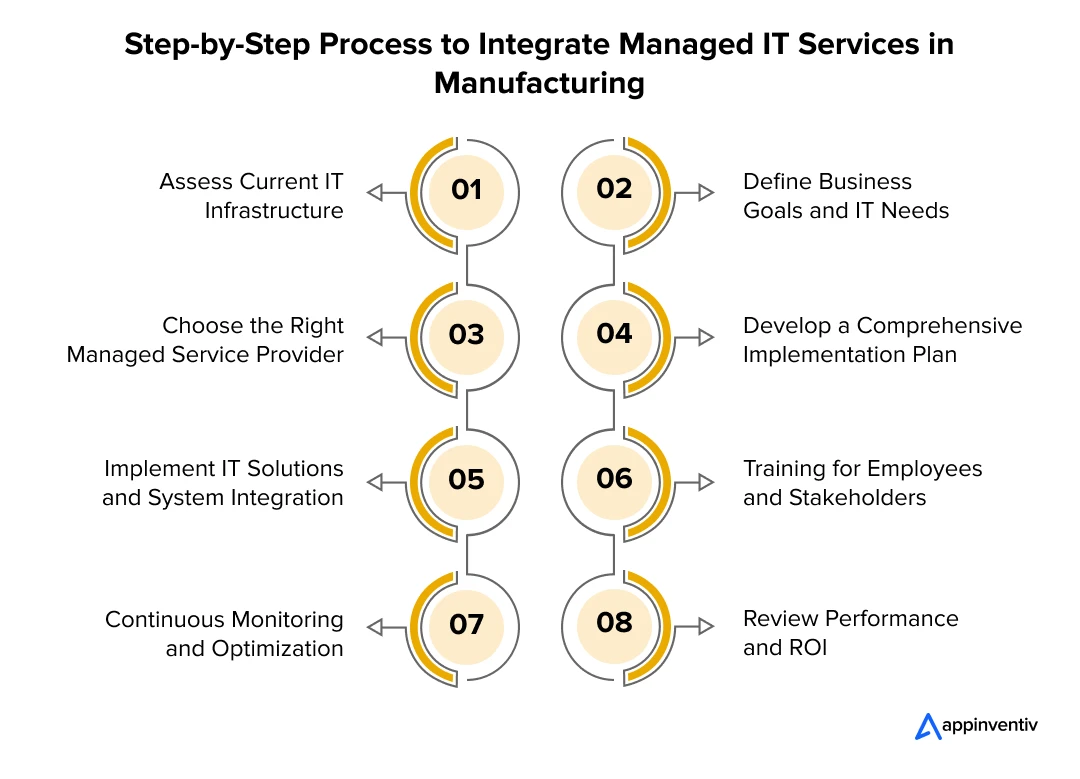
- Assess Current IT Infrastructure
The first step in implementing IT managed services for a manufacturing firm is to evaluate your existing IT infrastructure. This involves a thorough audit of current hardware, software, network systems, and overall data management practices. By understanding where inefficiencies or security risks lie, manufacturers can identify what’s working well and what needs improvement. This assessment provides the foundation for the services the MSP will need to provide.
- Define Business Goals and IT Needs
With a clear understanding of your existing systems, the next step is to define your business objectives and the role MSP manufacturing services will play in achieving them. Whether your goal is to improve operational efficiency, reduce downtime, enhance supply chain management, or integrate smart manufacturing technologies, aligning IT strategies with your business goals ensures the implementation will deliver meaningful results.
- Choose the Right Managed Service Provider
Selecting the right managed services for the manufacturing industry is pivotal to the success of your implementation. Look for a provider with a proven track record in manufacturing, along with expertise in the technologies and systems that your business relies on. The chosen MSP should offer scalable solutions that can grow with your business and should be committed to ensuring that security, compliance, and support are top priorities.
- Develop a Comprehensive Implementation Plan
Once an MSP is selected, the next step is to develop a detailed implementation plan. This plan should outline specific goals, timelines, and milestones to ensure a smooth integration process. It must also address key aspects such as system integration, data migration, and the deployment of new technologies, while accounting for potential disruptions. A well-structured plan would help keep the project on track and ensure that resources are efficiently utilized.
- Implement IT Solutions and System Integration
The implementation phase begins once the plan is in place. Here, the MSP will work to deploy the necessary hardware and software, integrate new systems with existing infrastructure, and ensure all security measures are met. This process can be complex, but having an experienced team that excels in managed IT services for manufacturing firms would ensure that the transition occurs with minimal disruption to daily operations. It’s also important to note that the integration of new technologies must be done in phases to allow for smooth adaptation.
- Training for Employees and Stakeholders
Once the systems are in place, training becomes essential to ensure that employees are equipped to effectively use the new technology. The training module should cover everything from basic functionality to advanced features, ensuring that everyone involved is confident in navigating the new systems. With proper guidelines in place, employees will be able to quickly adapt, reducing the learning curve and optimizing productivity from day one.
- Continuous Monitoring and Optimization
Following the successful implementation of managed IT services for your manufacturing company, continuous monitoring is critical to identify and address any emerging issues. Your managed IT services provider can be expected to regularly assess system performance, ensure security protocols are maintained, and identify areas for optimization.
- Review Performance and ROI
Lastly, regularly reviewing the performance of the managed IT services is crucial to determine if the goals of the integration are being met. This includes evaluating key performance indicators such as system uptime, cost savings, productivity gains, and process efficiency. By assessing the return on investment, manufacturers will be able to gauge the effectiveness of the efforts and make necessary adjustments to enhance the benefits of IT managed services for manufacturing.
By following these strategic steps, manufacturers can successfully implement managed IT services for manufacturing that not only meet immediate operational needs but also provide long-term benefits such as reduced costs, improved productivity, and enhanced business agility.
While the steps to integrate IT managed services for manufacturing a firm lay a strong foundation for success, the journey is not always straightforward. At Appinventiv, we recognize that even the best-laid plans can encounter unforeseen obstacles. As manufacturers move through the integration process, there are often roadblocks that can delay progress or complicate implementation. In the next section, we will explore some of these common challenges and how they can be effectively addressed to ensure a smooth transition to an optimized IT environment.
Challenges of Managed IT Services in Manufacturing Industry
As a managed IT service provider for the manufacturing industry, we are acutely aware of the unique challenges that come with implementing and maintaining IT solutions in this sector. While manufacturing IT services bring significant benefits, navigating the complexities of this domain requires careful planning and consideration. Below, we highlight some of the most common challenges we face and how we address them to ensure smooth IT operations for our clients.
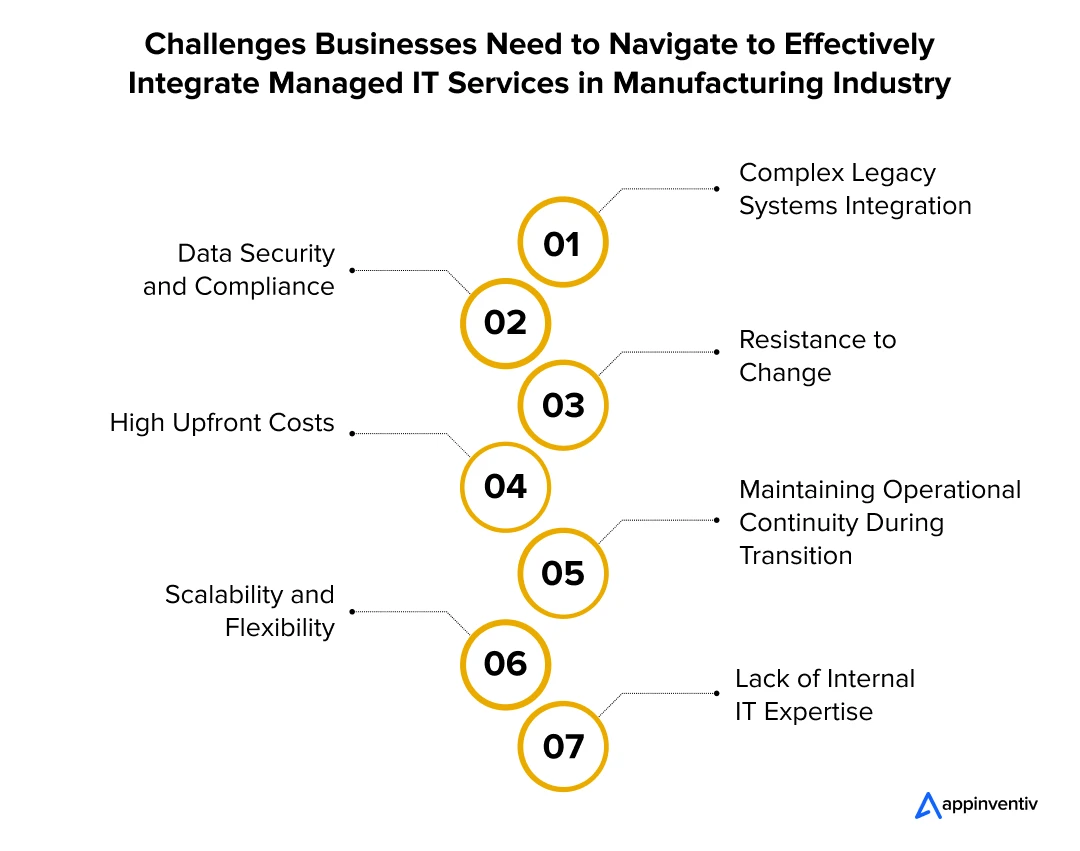
Complex Legacy Systems Integration
One of the key hurdles we encounter is the integration of managed IT services with legacy systems. Many manufacturers still rely on outdated hardware and software that were not designed to work with modern technologies. This creates a significant challenge when implementing new IT solutions, as these older systems often need extensive modifications to ensure compatibility with newer platforms.
Instead of a complete overhaul, we focus on assessing existing infrastructure and finding integration points between old and new systems. By making gradual updates, we ensure continued functionality while introducing new technologies, minimizing disruption and reducing the cost of full system replacements.
Data Security and Compliance
In manufacturing, sensitive data such as production schedules, inventory records, and proprietary designs must be handled with the utmost care. With an increase in cyber threats targeting the sector, maintaining data security is more critical than ever. Coupled with this is the constant need to comply with industry regulations regarding data privacy, safety, and quality standards.
As a trusted provider for managed IT services in manufacturing, we work diligently to safeguard our clients’ data by monitoring their systems for vulnerabilities and ensuring that compliance protocols are met, which can sometimes require intricate adjustments to existing security systems.
Resistance to Change
Adopting new technologies in the manufacturing sector often meets with some level of resistance. Employees may be used to already established processes, and changing those workflows can cause apprehension or reluctance. Overcoming this resistance involves clear communication and comprehensive training. We ensure that staff are fully aware of the long-term advantages of new IT systems, helping them understand how these tools will make their jobs easier and more efficient. This transition is key to ensuring that manufacturers reap the full benefits of their manufacturing managed services.
High Upfront Costs
Though IT managed services in manufacturing lead to significant cost savings over time, the initial financial investment can be a barrier for some manufacturers. The costs associated with upgrading infrastructure, training employees, and implementing new systems can be daunting.
To address this, we work closely with clients to develop solutions tailored to their budget, offering scalable options that grow with the business. This helps mitigate the financial strain of the initial investment, ensuring that manufacturers can enjoy the long-term benefits without overwhelming their resources.
Maintaining Operational Continuity During Transition
The implementation of new IT systems often requires downtime, which can disrupt production and lead to operational inefficiencies. To prevent this, we ensure a phased approach to deployment, allowing us to upgrade and integrate systems gradually, with careful attention to maintaining business continuity. Our aim is to minimize disruptions to daily operations, enabling manufacturers to experience the advantages of modern IT without compromising productivity.
Scalability and Flexibility
Another challenge is ensuring that IT solutions are scalable and flexible enough to grow with the business. Manufacturers must be able to adapt quickly to market changes and technological advancements. To address this, we design IT systems that not only meet current operational needs but are also built to scale as the business evolves.
By implementing adaptable managed services for the manufacturing industry, we ensure that companies can continue to expand and integrate new technologies without facing significant infrastructure limitations.
Lack of Internal IT Expertise
For many manufacturers, there’s often a gap in the expertise required to manage advanced IT systems. While some may have an in-house IT team, they may lack the specialized knowledge needed for cutting-edge technologies or security best practices.
As an MSP, we fill this gap by offering expert support, training, and resources to help manufacturers operate their IT systems effectively. Our goal is to empower manufacturers to leverage technology to its fullest potential, even if they don’t have a dedicated IT department.
Despite these challenges of managed IT services in the manufacturing industry, our experience with clients has allowed us to develop tailored solutions that address these pain points. By proactively identifying and addressing these issues, we help manufacturers unlock the full potential of managed IT services, driving efficiency, cost savings, and long-term success in a rapidly evolving industry. Wish to witness our MSP manufacturing efforts first-hand? Let’s talk.
While navigating the challenges of implementing managed IT services for manufacturing firms can seem daunting, it also opens the door to new opportunities. As manufacturers adapt to these obstacles, they are increasingly looking toward emerging trends to drive innovation and efficiency.
In the next section, we will dive into the key trends shaping the future of IT services in manufacturing, highlighting how these trends can help businesses stay ahead of the curve and transform challenges into long-term advantages.
Trends Shaping the Role of IT Services in Smart Manufacturing
It is unquestionable that the manufacturing industry will continue its significant transformation, driven by technological advancements that will enhance efficiency, agility, and innovation. As producers increasingly rely on managed IT services, several key trends will shape the future of the sector, helping businesses stay competitive while optimizing their operations.
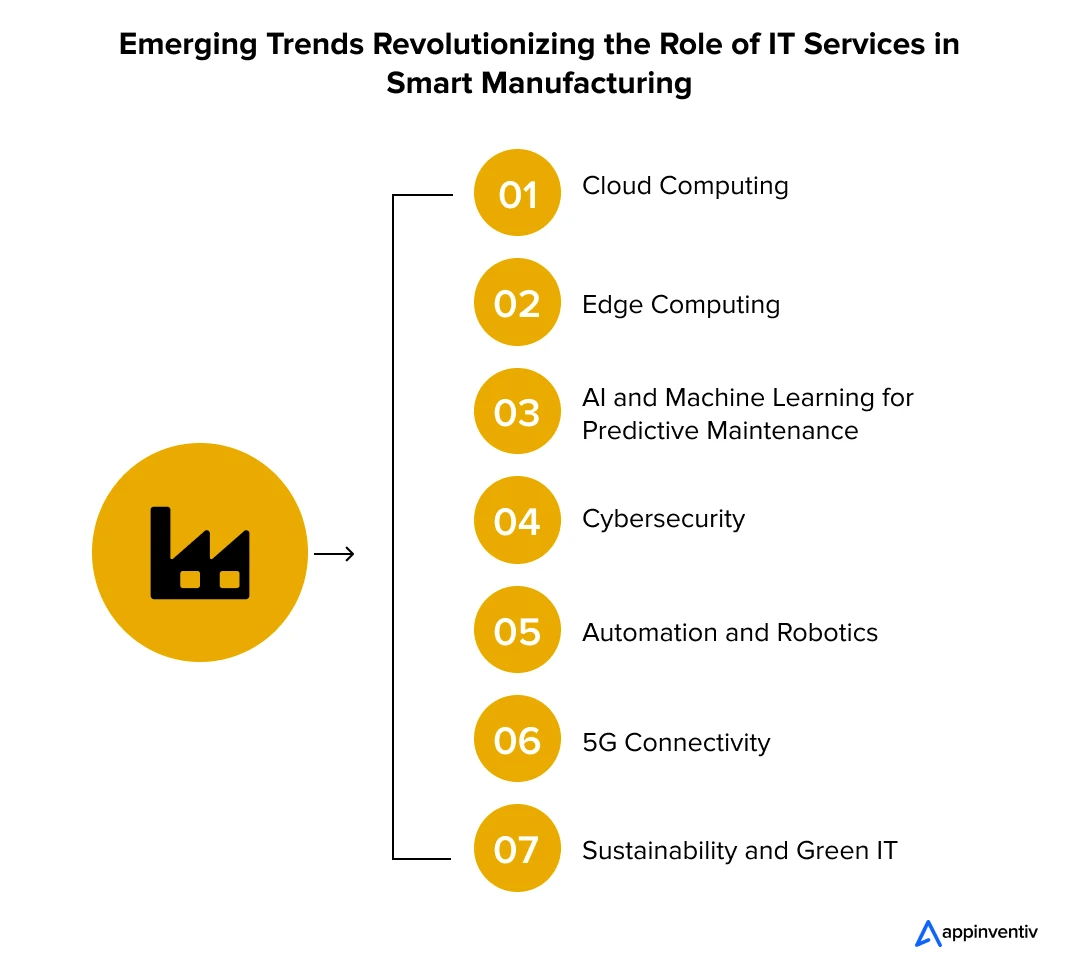
- Cloud Computing
Manufacturers will increasingly adopt cloud-based platforms for storing and accessing data. This will offer scalability, cost-efficiency, and real-time data accessibility, simplifying operations by reducing the need for complex on-site infrastructure and enabling manufacturers to streamline their processes.
Also Read: Cloud Manufacturing Software Development – Benefits, Process, Costs
- Edge Computing
As IoT devices proliferate, edge computing will become crucial for manufacturers to process data closer to the source. This will reduce latency, enabling faster decision-making and optimizing production lines. Real-time data processing will also become more efficient, ensuring smooth operations across the board.
- AI and Machine Learning for Predictive Maintenance
AI in manufacturing will be increasingly used to predict equipment failures before they occur. This proactive approach will reduce unplanned downtime, extend machinery lifespan, and lower maintenance costs, ultimately driving productivity and operational efficiency.
- Cybersecurity
As the industry becomes more interconnected, the demand for robust cybersecurity solutions will grow. Manufacturers will implement advanced security measures, including encryption, multi-factor authentication, and AI-based threat detection, to protect critical infrastructure and sensitive data from rising cyber threats.
- Automation and Robotics
IT services will enable the integration of automation tools and robotics, allowing manufacturers to streamline their production processes, reduce human error, and improve worker safety. These technologies will not only reduce costs but will also enhance operational efficiency and consistency.
- 5G Connectivity
The rollout of 5G networks will revolutionize manufacturing by providing ultra-fast, low-latency connectivity. This will enable real-time communication between machines, devices, and systems, supporting IoT growth and enhancing the efficiency of data collection and analysis on production lines.
- Sustainability and Green IT
Manufacturers will focus more on reducing their environmental impact by adopting energy-efficient solutions and sustainable technologies. Managed application services will help businesses achieve greener operations, from eco-friendly data centers to sustainable supply chain management, supporting both operational goals and corporate social responsibility.
Implementing manufacturing managed services is essential for businesses aiming to stay competitive in today’s tech-driven landscape. While there are challenges during integration, the long-term benefits and growth opportunities far exceed the potential risks of staying behind. By focusing on key IT components and keeping up with industry trends, manufacturers can enhance efficiency, security, and innovation.
How Does Appinventiv Come Into the Picture?
We hope this guide has provided a clear view of how crucial managed IT services are in the manufacturing industry. These services are not just about keeping up with technological trends but in fact, they are about fundamentally transforming operations to enhance efficiency and security.
For manufacturing businesses looking to implement these changes, it’s important to choose a partner who understands the unique challenges of the industry. As a leading manufacturing IT services provider, we understand the evolving demands of the manufacturing industry and specialize in crafting tailored managed IT services to meet these challenges. Our expertise lies in designing scalable, secure, and efficient IT infrastructures that streamline operations and enhance productivity.
We take a hands-on approach to integrating advanced technologies like IoT and cloud computing while modernizing legacy systems to ensure seamless compatibility. Being a dedicated Managed IT services firm, we focus on proactive IT management, we help manufacturers minimize downtime, optimize costs, and maintain a competitive edge in the rapidly transforming landscape of smart manufacturing.
From predictive maintenance solutions to enabling smart factory capabilities and securing critical data, our goal is to empower manufacturing businesses with IT services that are not only robust but future-ready.
If you’re ready to optimize your manufacturing operations with managed IT services, get in touch with us. As a leading IT outsource services firm, we can help you build a secure, efficient, and future-ready IT infrastructure for your business.
FAQs
Q. How do managed IT services improve manufacturing efficiency?
A. Managed IT services streamline manufacturing processes by integrating advanced technologies like IoT, cloud computing, and automation tools. They optimize workflow management, reduce system downtime through proactive monitoring, and enhance communication across teams with reliable IT infrastructure.
Additionally, MSPs provide data-driven insights, enabling manufacturers to make smarter decisions, improve production schedules, and address inefficiencies in real time.
Q. Exactly what services do managed service providers provide?
A. Managed service providers offer a wide range of services tailored to meet manufacturing needs, including:
- Network Management: Monitoring and maintaining IT networks to ensure reliability and security.
- Cybersecurity Solutions: Protecting systems from threats with firewalls, encryption, and regular vulnerability assessments.
- Cloud Services: Providing scalable storage, backup solutions, and cloud-based applications.
- IT Support: Offering 24/7 technical assistance and troubleshooting.
- Data Analytics: Delivering insights to improve production efficiency and reduce waste.
- Compliance Management: Ensuring IT systems meet industry standards and regulations.
- IoT Integration: Connecting devices and equipment for real-time monitoring and automation.
Q. How can you achieve cost savings with IT services in manufacturing?
A. Cost savings are achieved through optimized operations, minimized downtime, and better resource management. Managed IT services enhance equipment efficiency by enabling predictive maintenance, reducing the likelihood of costly breakdowns. They also automate routine tasks, lowering manual labor costs.
By utilizing cloud solutions, manufacturers can cut expenses on physical servers and maintenance. Additionally, MSPs implement robust cybersecurity measures, reducing the financial risks associated with data breaches or system disruptions.
Product Development & Engineering
IT Managed & Outsourcing
Consulting Services
Data Services
Didn't find what you're looking for? Let us know your needs, and we'll tailor a solution just for you.

































